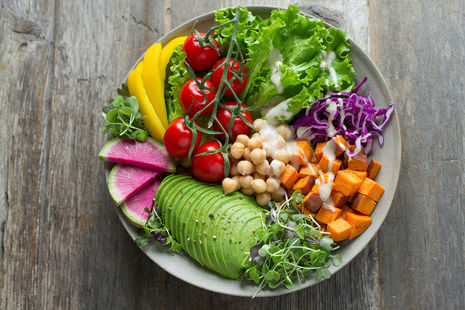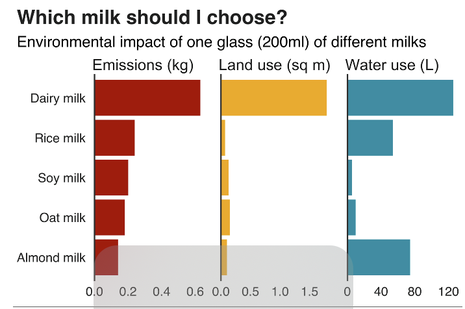Veganuary: are you doing it right?
This year, as before, Veganuary has kicked off with the start of the new year, with new people trying a vegan diet. Clodagh Bottomley explores how to ensure that a vegan diet is sustained alongside prioritising your health and the environment

For the eighth year running, the UK charity ‘Veganuary’ is encouraging restaurants, shops, and individuals across the world to undertake a 31-day Vegan pledge. The number of vegan products on sale to cater for this growing contingent is increasing dramatically. Not only does this expanding range prevent anyone from using lack of choice as a justification for their meat-eating habits, but it also brings a new challenge for vegans of 2022: how to choose what to eat.
The participants of Veganuary cited several reasons for their decision to go Vegan last January. The most common was for the animals (46%), followed by health (22%) and the environment (21%). Whilst all products with the vegan stamp will save the animals (and your conscience), other priorities, in addition to taste and price, might help determine which milk to have in your coffee or whether to vote Linda or Richmond for the best sausages.
Veganuary for a Healthy January
To any vegans or vegetarians having just spent Christmas with concerned and loving relatives, you may have been subject to questions about how you’ll grow big and strong without protein from a Christmas Day Turkey. Whilst tempting to dismiss them completely, these concerns are not unfounded. In a meat-eater’s diet, meat and dairy are the major sources of protein, hence, going vegan without replacing this source of protein would be unhealthy. However, there are many plant-based sources of protein to replace this ensuring a nutritious vegan diet.
“Overall, as long as there is protein in your diet, in whatever form, you’re on track for a healthy Veganuary”
In terms of protein content, one of the ‘best’ meat substitutes is seitan, familiar (and perhaps not all that popular) to fans of Wagamama’s Vegatsu. Seitan has a higher protein content than some meats, including white turkey meat. Despite topping the table as having the highest concentration by weight, seitan’s protein content is mostly made up of the amino acids methionine and cysteine and lacks lysine. If seitan is your substitute of choice, it is often recommended to cook it in soy sauce, which adds some lysine and much-needed flavour. Additionally, seitan is made of concentrated gluten, which is not suitable for gluten-free diets and is relatively high in calories. Other high protein substitutes include tempeh and tofu, both made from soybeans. These soy products have the additional benefit of high iron content. Since the iron requirement for non-meat-eaters is 1.8 x higher due to different forms of iron, this is important. Finally, legumes and nuts have a good amount of protein and iron and are an excellent source of complex carbohydrates to help the gut. Overall, as long as there is protein in your diet, in whatever form, you’re on track for a healthy Veganuary.
Veganuary for a Green January
The levels of greenhouse gas emissions from the meat and dairy industry are second only to energy, so it is no surprise that Veganism is a great way to help the planet. In addition to greenhouse gas emissions, the land and water demands for meat and dairy produce further damage the planet, but is a vegan diet necessarily greener?
The short answer is yes. Although some vegetables, vegan milk or meat substitutes are more environmentally friendly than others, emissions, water, and land use are consistently lower for vegan products. Even the water requirement for the infamous avocado, as high as 300 litres for a single avocado, is significantly lower than the amount required for a hamburger. However, for those wanting to take Veganuary a step further, there are some products to favour and others, including avocadoes, to avoid...
Consider the dilemma of choosing a milk substitute. If there’s one to avoid, it’s probably rice milk. Rice paddies require a huge amount of water, and the fertilizer required pollutes waterways and lack the nutritional benefit of other substitutes. They also provide a home for methane-pumping bacteria making rice milk responsible for more greenhouse gas emissions than any other plant milk.

Almond milk is a popular choice, but whilst almonds may deserve brownie points for low emissions, the high- water requirement (130 pints of water for a single glass of almond milk) is a key drawback. Not only do almonds require the most water, but they also require bees to pollinate them. 70% of commercial bees in the US are drafted for almond pollination, up to 1/3 of which die by the end of the season - just something to bear in mind if you are going vegan to save animals!
The remaining options, soy and oat milk, are sustainability champions requiring little land and water and releasing minimal emissions. But regardless of what milk you’re drinking or the meat substitute you’re eating, everyone participating in Veganuary this month is a true sustainability champion and is helping to make 2022 greener.
 News / Colleges charge different rents for the same Castle Street accommodation2 March 2026
News / Colleges charge different rents for the same Castle Street accommodation2 March 2026 News / News in Brief: waterworks, wine woes, and workplace wins 1 March 2026
News / News in Brief: waterworks, wine woes, and workplace wins 1 March 2026 News / Climate activists protest for ‘ethical careers policy’1 March 2026
News / Climate activists protest for ‘ethical careers policy’1 March 2026 News / Angela Merkel among Cambridge honorary degree nominees27 February 2026
News / Angela Merkel among Cambridge honorary degree nominees27 February 2026 News / Private school teacher who lied about Cambridge degree barred from teaching27 February 2026
News / Private school teacher who lied about Cambridge degree barred from teaching27 February 2026










